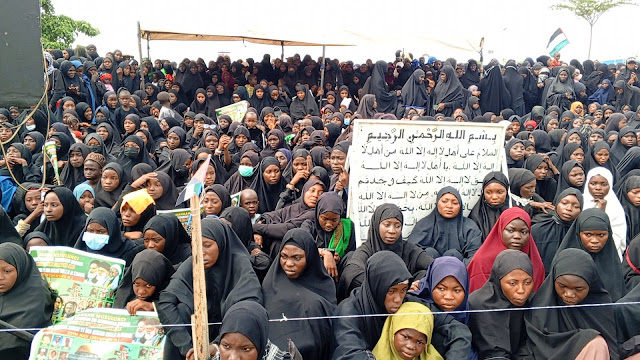In a solemn gathering at the Jannatu Darur Rahma cemetery in Dembo, Zaria, the Islamic movement in Nigeria, under the leadership of Sheikh I...
In a solemn gathering at the Jannatu Darur Rahma cemetery in Dembo, Zaria, the Islamic movement in Nigeria, under the leadership of Sheikh Ibraheem Zakzaky, marked the 11th anniversary of the 2014 Quds Day killings. The remembrance, held on Friday, honoured the memory of 34 members who were shot and killed by Nigerian soldiers during a peaceful procession in support of Palestine.
The commemoration was characterised by emotional tributes, prayers, Qur’anic
recitations, and renewed calls for justice. The movement reiterated its
continued solidarity with the people of Palestine, describing its stance as unchanging
and deeply rooted in its values and mission.
Speaking to journalists, Sayyid Badamasi
Yaqoub, a close associate of Sheikh Zakzaky, highlighted the ongoing struggle
for justice, describing it as a path long trodden by prophets and those who
champion truth.
“This path is not new, and it does not
change,” he said. “It is the path of calling people to the religion of Allah—a
path that comes with risks, including death. Those who believe and stand
against oppression often attract the hostility of those in power.”
Sayyid Yaqoub emphasised that the victims of
the 2014 massacre were killed not for any crime, but simply for proclaiming, ‘Our Lord is Allah’, and for refusing to bow
to injustice. He stressed that the movement would continue its resistance
against oppression and that the memory of the fallen would never fade.
“These martyrs died for the cause of Quds,” he
said. “What is happening in Gaza today is a tragedy the world must confront.
Gaza is surrounded by Muslim-majority countries, yet those nations have blocked
aid and turned a blind eye to the suffering. Israel was created on Muslim land,
and countries like Egypt and Jordan continue to restrict humanitarian access.
People are starving to death—and these regimes are complicit.”
He added passionately: “We stand with the
people of Gaza, and by Allah, if given the chance, we would go and defend them,
even with our own blood.”
Malam Ibrahim Abubakar, one of the event organisers, noted that the movement
commemorates the Zaria killings every year on July 25.
“On this day in 2014, 34 people were killed
and over 80 injured—some severely—by soldiers during the Quds Day procession,”
he said. “Every year, we come here to remember them through prayer, Qur’anic
recitation, and reflection. It is our duty to honour their sacrifice.”
He added that those who speak out for truth
and justice should expect challenges, but must remain steadfast, especially in
standing with the Palestinian cause.
Maryam Dalhatu, who lost relatives in the 2014
attack, said she was grateful for the continued remembrance but still mourns
their loss.
“My message to the oppressors is simple: the
path of violence and the killing of innocents leads nowhere. Their actions will
only bring them ruin, in this life and the next,” she said.
Alkasim Muhammad Gyallesu, one of the
survivors of the massacre, recalled being shot by soldiers while participating
peacefully in the procession.
“We were unarmed,” he said. “All we did was
express solidarity with Palestine and denounce injustice. I still live with the
physical pain from the bullets fired that day.”
The ceremony began with prayers and Qur’anic
recitation, followed by a symbolic parade and speeches from scholars and
community members. As the day concluded, the Islamic movement reaffirmed its
enduring commitment to justice and to the Palestinian cause, vowing that the
memory of the Zaria martyrs would never be forgotten.









.jpeg)

No comments